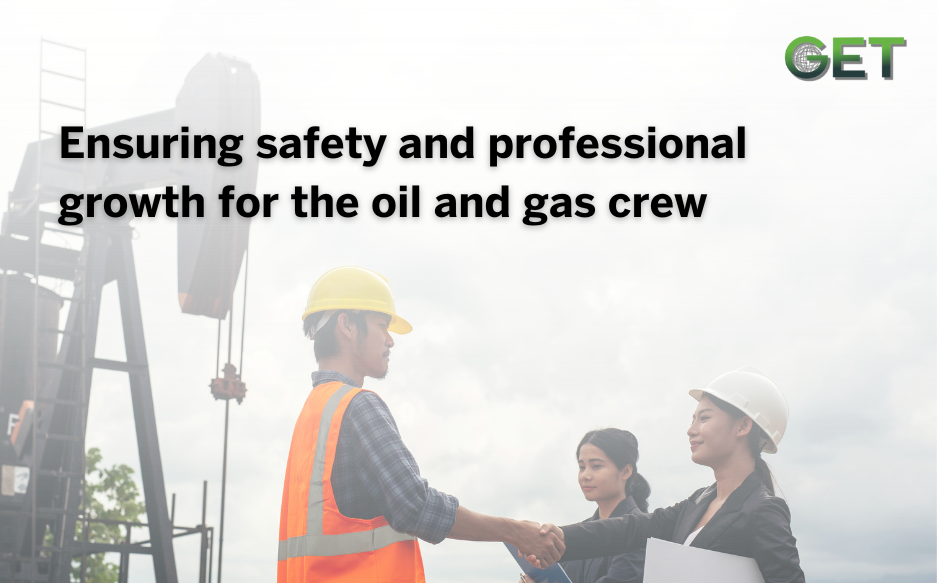
The oil and gas industry are exciting and challenging, and yet, at the same time, a very hazardous one. Crew members are expected to work 24X7 over an extended period, more often in extremely hostile terrains in geographically diverse locations. At remote sites, dangers manifest in the form of exposure to harmful gases, radiation, and handling dangerous machinery. The long periods of separation from civilization during the hitch periods also take their toll on their emotional and psychological well-being.
At a time of talent crunch, organizations worldwide are going the extra mile to retain and engage their talent as part of their recruitment and deployment strategy. This becomes all the more imperative for the oil and gas industry which records one of the highest risks of job-related injuries and fatalities compared to other industries.
GET, a reputed company that provides turnkey outsourced solutions for the upstream Oil & Gas industry including expertise-based service with domain expertise in the upstream, is committed to implementing best practices in crew deployment to ensure their physical and emotional safety. We make sure that our staff receive constant training to align with the industry, and they have ample professional space to grow their careers, while also achieving work-life balance.
Here are some of the deployment practices we follow.
GET deploys its oil and gas crew in projects across the globe including the USA and the MENA region. In all areas of our operations, we have partnered with local emergency response organizations to ensure that our oil and gas crew gain access to immediate professional help to handle emergencies efficiently, on time, and successfully.
As another oil and gas crew deployment best practice, we implement a personal approach to safety training. We make sure that during the safety training, team members get to know each other and develop personal connections, trust, and camaraderie among themselves. Our safety training modules are constantly evolving and always aligned with international regulations and compliance, as well as local mandates. Given that it’s extremely difficult for the crew to undertake training in the traditional setting, we also undertake remote training via the Internet, and instructor-led training onsite, if the need arises.
It goes without saying that working in adverse environments is much different than working in the comfort of a corporate office. These differences in working conditions mandate mindsets, behaviors, and attitudes that are unique to the environment. Accordingly, our oil and gas employee training programs go well beyond upskilling and reskilling to instill a sense of community amongst the workers to make it easier for them to form connections and offset the loneliness arising from being away from their family and friends during long periods. Second, the community becomes the first port of call for workers to seek advice and ask for help. Beyond the community itself, GET has in place smooth communication channels for the crew members to seek immediate one-to-one help from our healthcare advisors. Further, we also conduct regular in-house surveys to glean insights into the ‘mood of our employees’ and accordingly propose remedial action.
Also Read- The Role of HSE Practices in the Upstream Oil and Gas Industry
Before deploying the crew to a work location, we first make sure to familiarize them with the project site so that they are aware of the socio-cultural background and religious practices of the country. This is to ensure that they respect local practices, and they find it easier to integrate with the local communities. Second, we also train them in the local mandates and regulatory environments, along with the global compliance they must always follow. All our crew members are given written communication of the procedures to follow, hazards they need to be aware of, their shift handovers, and the emergency contacts at the project site.
In the oil and gas industry, the vast majority of fatalities can be attributed to motor vehicle accidents. GET ensures that all vehicles used in the transport of human resources and materials have in-vehicle monitoring systems to monitor driving behavior and analyze issues. We use these insights to improve our vehicle safety programs and work-related training.
These are just a few aspects of our oil and gas crew deployment services. While deploying crew at a project site, we ensure that each member is well-aligned to the needs of the project, has the necessary experience, and if not, is well-trained to fit in their new role with dexterity. Before deploying a crew member, we collate all their information, such as their work history, any work-related incidents, and other communication notes. Our HR team then analyzes the information and gleans the necessary insights to ensure they are trained for the project. We also take care of the necessary expenses. To illustrate with an example, for oil and gas jobs in Qatar, we ensure that the crew has their visas and other necessary clearances. We also take care of their travel and accommodation expenses, and any health or safety expenses that could occur due to an accident at the worksite.

By Get global | February 27, 2026
The oil and gas industry is complex and high-risk, making it essential for operators to select oilfield service partners based on more than just price or equipment availability. In the upstream sector—especially in the Middle East—Health, Safety, and Environmental (HSE) performance is now a key factor in decision‑making. Strong HSE […]

By Get global | February 24, 2026
Choosing an oilfield service provider rarely feels like a risky decision at the start. On paper, most providers look capable. Certifications are in place. Equipment lists are impressive. Commercial terms appear competitive. The problems usually show up later. A few weeks into operations. After the first unplanned shutdown. When coordination […]

By Get global | February 19, 2026
In today’s constantly evolving energy landscape, selecting the right Upstream Oilfield Services Provider is not only essential but also a strategic decision that directly influences the performance, safety and well being of the workforce. The upstream oil and gas sector operates in one of the most hazardous and risk – […]

By Get global | February 12, 2026
In today’s rapidly evolving energy landscape, the upstream segment is not only crucial in the oil and gas industry but also the basis of finding and exploring hydrocarbons. As projects move into deeper and much complex territories, upstream companies are involved in all the phases of the oil and gas […]

By Get global | February 6, 2026